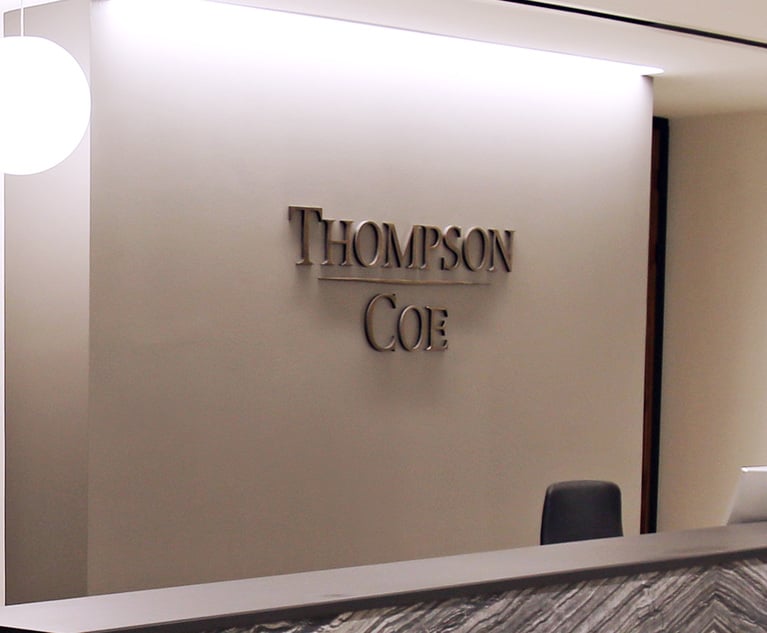3 Jones Day Leaders Can Overrule Others in Pay Decisions, Plaintiffs Say
According to plaintiffs in a discrimination suit, there were at least 23 instances in which Jones Day managing partner Stephen Brogan overruled the pay recommendations of local firm leaders.
July 21, 2020 at 06:49 PM
4 minute read
 Courtesy photo
Courtesy photo
Three firmwide leaders at Jones Day are responsible for making compensation decisions at the 2,500-lawyer firm, according to the newest filing in the $200 million gender discrimination lawsuit against the firm.
This allegation was made in a Monday filing by a group of former female associates who are seeking conditional certification for their Equal Pay Act claims against Jones Day. The plaintiffs accuse the firm of perpetuating a culture of gender discrimination through its compensation model and leadership structure.
Local office leaders at Jones Day will make recommendations, which can then be modified by managing partner Stephen Brogan, administrative partner Michael Shumaker and partner Traci Lovitt, the plaintiffs said.
"It is this substantial and meaningful involvement by managing partner Brogan and two other firm-wide leaders that makes this case appropriate for certification," the plaintiffs wrote in their brief.
According to the plaintiffs, Jones Day has disclosed that there were at least 23 instances in which Brogan, who is described in an amended complaint as ruling the firm with "unchecked autonomy," overruled the pay recommendations of local firm leaders. In three of those instances, Brogan and his colleagues upped the pay increases given to male associates by $20,000 to $40,000, the plaintiffs added. By comparison, female associates would see their pay go up or down by $5,000, they added.
For the past week, Jones Day has been targeting the Equal Pay Act claims the plaintiffs—Nilab Rahyar Tolton, Andrea Mazingo, Meredith Williams, Saira Draper, Jaclyn Stahl and Katrina Henderson—made in their lawsuit, which was first filed in April 2019.
First, Jones Day sought summary judgment on the remaining equal pay claims, arguing that the discovery conducted so far in the case undermines those claims. Then the firm filed its own motion opposing conditional certification.
"In an effort to establish a common legal theory," Jones Day said in a July 15 filing, "plaintiffs argue that Jones Day's compensation system is 'centralized' due to review of all associate pay adjustments by Shumaker, Brogan, and in later years, Lovitt. They say all members of the collective 'challenge the same centralized compensation policy set by managing partner Brogan.' They argue that this 'centralized compensation policy' is what ties together their claims and warrants certification of the claims for collective adjudication." However, the firm said, plaintiffs' "centralization theory Is both legally and factually meritless."
At a status conference Tuesday, U.S. District Judge Randolph Moss of the District of Columbia gave the plaintiffs until Aug. 10 to respond to Jones Day's motion for summary judgment on the equal pay claims and set another conference call for Aug. 3.
Russell Kornblith, the New York managing partner of Sanford Heisler Sharp and one of the plaintiffs' attorneys, previously told The American Lawyer that the condition certification they're seeking has a low bar to clear. Much lower than the class certification they're seeking for their Title VII claims, he added.
Jones Day partner Mary Ellen Powers, one of the lawyers representing the firm, accused the plaintiffs of distorting the facts of the case.
"Plaintiffs have blatantly mischaracterized the record," Powers said in a statement. "Jones Day has repeatedly denied that it pays women less than men and denied that all compensation decisions are made centrally by three individuals. No one could read the firm's litigation submissions and fairly conclude otherwise."
Representatives for the plaintiffs did not respond to requests for comment Tuesday.
Read More:
Jones Day Looks to Dislodge Equal Pay Claims in $200M Lawsuit
Jones Day Must Produce Associate Salary Data in Gender Bias Suit, Judge Rules
Jones Day Must Face Black Box Compensation and Gender Bias Claims, Judge Rules
This content has been archived. It is available through our partners, LexisNexis® and Bloomberg Law.
To view this content, please continue to their sites.
Not a Lexis Subscriber?
Subscribe Now
Not a Bloomberg Law Subscriber?
Subscribe Now
NOT FOR REPRINT
© 2025 ALM Global, LLC, All Rights Reserved. Request academic re-use from www.copyright.com. All other uses, submit a request to [email protected]. For more information visit Asset & Logo Licensing.
You Might Like
View All
KPMG Wants to Provide Legal Services in the US. Now All Eyes Are on Their Big Four Peers



K&L Gates Sheds Space, but Will Stay in Flagship Pittsburgh Office After Lease Renewal
Law Firms Mentioned
Trending Stories
- 1iRobot Picks Up Law Firm Partner as New Legal Chief
- 2Baker McKenzie Spins Off AI-Powered Risk Management Tool SCOREalytics as Independent Business
- 3Edison Hit With Lawsuits Over Devastating Eaton Fire in Los Angeles
- 4Does Society’s Focus on Children’s Sexuality Make Them Vulnerable to Grooming?
- 5California Lawmakers Reach $50M Deal to Fund Legal Fights Against Trump
Who Got The Work
Michael G. Bongiorno, Andrew Scott Dulberg and Elizabeth E. Driscoll from Wilmer Cutler Pickering Hale and Dorr have stepped in to represent Symbotic Inc., an A.I.-enabled technology platform that focuses on increasing supply chain efficiency, and other defendants in a pending shareholder derivative lawsuit. The case, filed Oct. 2 in Massachusetts District Court by the Brown Law Firm on behalf of Stephen Austen, accuses certain officers and directors of misleading investors in regard to Symbotic's potential for margin growth by failing to disclose that the company was not equipped to timely deploy its systems or manage expenses through project delays. The case, assigned to U.S. District Judge Nathaniel M. Gorton, is 1:24-cv-12522, Austen v. Cohen et al.
Who Got The Work
Edmund Polubinski and Marie Killmond of Davis Polk & Wardwell have entered appearances for data platform software development company MongoDB and other defendants in a pending shareholder derivative lawsuit. The action, filed Oct. 7 in New York Southern District Court by the Brown Law Firm, accuses the company's directors and/or officers of falsely expressing confidence in the company’s restructuring of its sales incentive plan and downplaying the severity of decreases in its upfront commitments. The case is 1:24-cv-07594, Roy v. Ittycheria et al.
Who Got The Work
Amy O. Bruchs and Kurt F. Ellison of Michael Best & Friedrich have entered appearances for Epic Systems Corp. in a pending employment discrimination lawsuit. The suit was filed Sept. 7 in Wisconsin Western District Court by Levine Eisberner LLC and Siri & Glimstad on behalf of a project manager who claims that he was wrongfully terminated after applying for a religious exemption to the defendant's COVID-19 vaccine mandate. The case, assigned to U.S. Magistrate Judge Anita Marie Boor, is 3:24-cv-00630, Secker, Nathan v. Epic Systems Corporation.
Who Got The Work
David X. Sullivan, Thomas J. Finn and Gregory A. Hall from McCarter & English have entered appearances for Sunrun Installation Services in a pending civil rights lawsuit. The complaint was filed Sept. 4 in Connecticut District Court by attorney Robert M. Berke on behalf of former employee George Edward Steins, who was arrested and charged with employing an unregistered home improvement salesperson. The complaint alleges that had Sunrun informed the Connecticut Department of Consumer Protection that the plaintiff's employment had ended in 2017 and that he no longer held Sunrun's home improvement contractor license, he would not have been hit with charges, which were dismissed in May 2024. The case, assigned to U.S. District Judge Jeffrey A. Meyer, is 3:24-cv-01423, Steins v. Sunrun, Inc. et al.
Who Got The Work
Greenberg Traurig shareholder Joshua L. Raskin has entered an appearance for boohoo.com UK Ltd. in a pending patent infringement lawsuit. The suit, filed Sept. 3 in Texas Eastern District Court by Rozier Hardt McDonough on behalf of Alto Dynamics, asserts five patents related to an online shopping platform. The case, assigned to U.S. District Judge Rodney Gilstrap, is 2:24-cv-00719, Alto Dynamics, LLC v. boohoo.com UK Limited.
Featured Firms
Law Offices of Gary Martin Hays & Associates, P.C.
(470) 294-1674
Law Offices of Mark E. Salomone
(857) 444-6468
Smith & Hassler
(713) 739-1250










